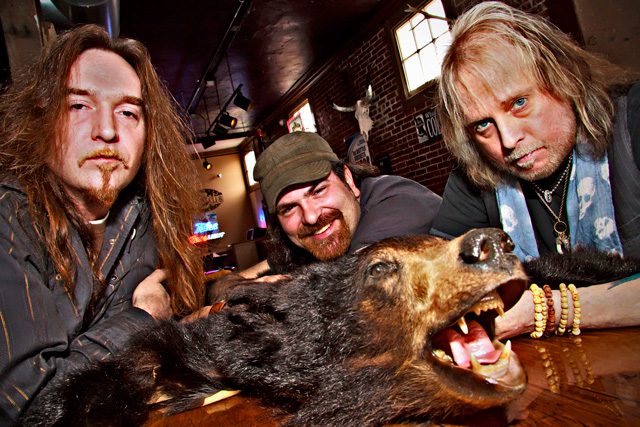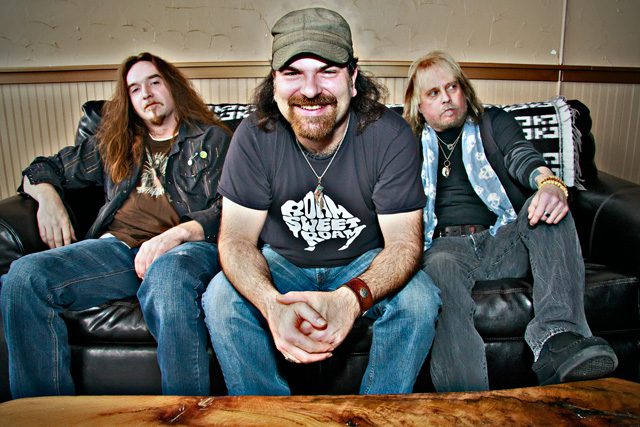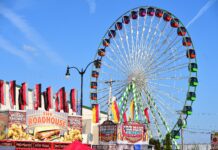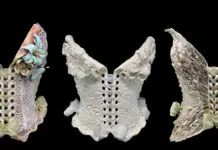
[dropcap]In[/dropcap] a song of his called “Sweet Euphoria,” Oklahoma-based guitarist and vocalist Matt Mason sings of being “addicted to cold steel blades” and then “complaining about the scars.” To Mason, who’s been at it long enough to know, it’s an apt metaphor for both the joys and the pains of performing rock music for a living.
“That line came from an interview I heard with a guy named Chris Cornell, who’s the singer for Soundgarden,” he says. “I thought, ‘That’s really powerful.’ It’s all flashy, just like a steel blade. You grab hold of it and you get cut a few times. Then you have to figure out, ‘How do I grab it and turn it around the other way?’ And every time you think you’ve got it figured out, something else happens – the market changes. The world changes. I never would’ve figured it would be like this when I was 16 or 17.”
At that time Mason was up in Bartlesville, working at learning the guitar. “I played classical violin when I was a kid through the Suzuki Method for about five years,” he recalls. “After I gave that up, two or three years went by and I decided, ‘Well, I really like the sound of a guitar. I like the way it makes me feel when I listen to it. Let’s see if I can do it.’”
It was tougher than he thought, but he persevered, and soon he had his first group. He and the band’s other members were Boy Scouts, and one of their shared goals was to get merit badges in music. Helping them along was a man named Joe Figard, the father of one of Mason’s bandmates. A technical advisor for Phillips Petroleum, he was also a serious guitarist, music fan and member of the R&B group Dues Paid. Soon, Figard was expanding young Mason’s musical horizons.
“He was just one of those cosmic-type people you meet,” Mason recalls. “We’d go over to his house and jam, and he’d say, “Here’s ‘Breezin’’ by George Benson.’ I’d be like, ‘Who’s George Benson?’ He could pull down a record and say, ‘Here’s their best stuff,’ and then show you how to play it. Once I got the merit badge finished up, he’d give me a stack of books – about [blues guitarist] Brownie McGhee, [German rock guitarist] Michael Schenker, [metal guitarist] Randy Rhoads – and say, ‘Come and talk to me if you have any questions.’ He’d tell me about hanging out with Parliament-Funkadelic back in ’68, seeing Hendrix and Led Zeppelin, playing and doing all these things, and I thought, ‘Man! That’s the life I want.’”
So, with Figard as inspiration, he sought it. While pursuing his degree in human resource management at Oklahoma State University in the mid-to-late ’90s, Mason played in what he laughingly describes as “the last bell-bottom band on earth,” Tie-Dyed Sunrise, which reflected his love for the rock music of an earlier time.
“We played lots of hippie stuff,” he remembers. “That was when the grunge thing was happening, and we were playing what everybody thought of as classic rock.”

After that group broke up, Mason joined a nine-person country band called Barely Bent and made the rounds of the Moose and Elks Lodges. “I had a lot of fun doing that, and it was different from what I’d been doing before,” he notes. He also started up a mail-order business that specialized in off-the-beaten-path CDs, bringing that with him to the Tulsa area following his graduation.
In Tulsa, where Mason hoped to find expanded musical opportunities, he began performing regularly in an acoustic duo with a friend from Stillwater, Mark Alan, and eventually formed Hurricane Mason, a rock trio that, perhaps ironically, got most of its jobs outside of town.
“We were playing Ponca City, Grand Lake, Bartlesville – 32 times in one year,” he says. “But Tulsa? All I was doing in Tulsa was acoustic music.”
Still, the group was working and building a following. And when the noted Tulsa bassist Ron Martin joined the group, says Mason, “That was kind of the next level. It solidified the lineup. I didn’t just have to scratch down 40 bar classics to play that night. I could say, ‘Remember how we did this? Remember this song we’ve been working on?’ It was a step up.
“But we all liked to drink,” he adds. “Those were the drinking days, and I don’t know how we made it through, honestly. There were so many nights and so many places it was like, `How did we even make it back to the hotel?’ Now, being a non-drinker, I remember what I’ve played. I remember what people said to me. I remember how they said it. It’s so liberating to leave and not have to worry about anything.”
In addition to a rigorous performing schedule, Hurricane Mason released one live and two studio discs between 2002 and 2007. During that time, both the records and the band itself attracted the attention of veteran bassist and producer Ace Eversole.
“When I saw them,” says Eversole, “I saw a band that had the gumption to get out and play and be professional, somewhat, in keeping gigs. And I had heard their records. I didn’t really hear a lot of realized stuff going on, but I knew there was potential to get there, and these guys were always out doing it.”
For his part, Mason had been aware of Eversole and his work since the ’80s. One day, while young Matt and his band were getting ready for a rehearsal in the family garage, his mother had brought them a copy of the Tulsa World, pointing out a story about a Tulsa act that was going to play the Cain’s Ballroom. It was the popular Tulsa-based metal outfit Flaxen Harlot, which included Eversole (and, the bassist notes, came “really close” to signing with Warner Bros).
Eventually, Eversole joined Mason and drummer Shawn Montgomery in Hurricane Mason. (Ron Martin passed away in ‘09.) And, in addition to playing bass, Eversole has been working for some time in production on a new Hurricane Mason album, Be the Wolf.
“What I wanted for this album was for us to be ourselves,” says Eversole. “There are country influences in it. There’s a lot of real rock. I think there’s a tangible Southern kind of Tulsa vibe. In Tulsa, you hear a lot of different stuff. It’s rock influenced by Tulsa and our surroundings.”
Like the lines about steel and scars in Mason’s “Sweet Euphoria,” the words in the CD’s title mean a lot to the boys in the band.
“There’s a quote I saw that goes, ‘The lion and the tiger may be more powerful, but the wolf doesn’t perform in the circus,’” Mason says. “I love that. It takes a lot to think outside the box in a city like Tulsa. It takes a lot to show up at a jam session and go, ‘No, we’re not playing Eric Clapton. We’re playing Rory Gallagher. We’re not playing Stevie Ray Vaughan, we’re playing Frank Marino and Mahogany Rush.’ It takes a lot of courage to do that. You can’t just be part of the big herd moving one way. You’ve got to be the lone wolf. You’ve got to be out there looking for every opportunity, everything you can think of.
“This record’s been called about four different things since we started doing it,” he concludes. “But this is the good title, and the music supports it.”

























